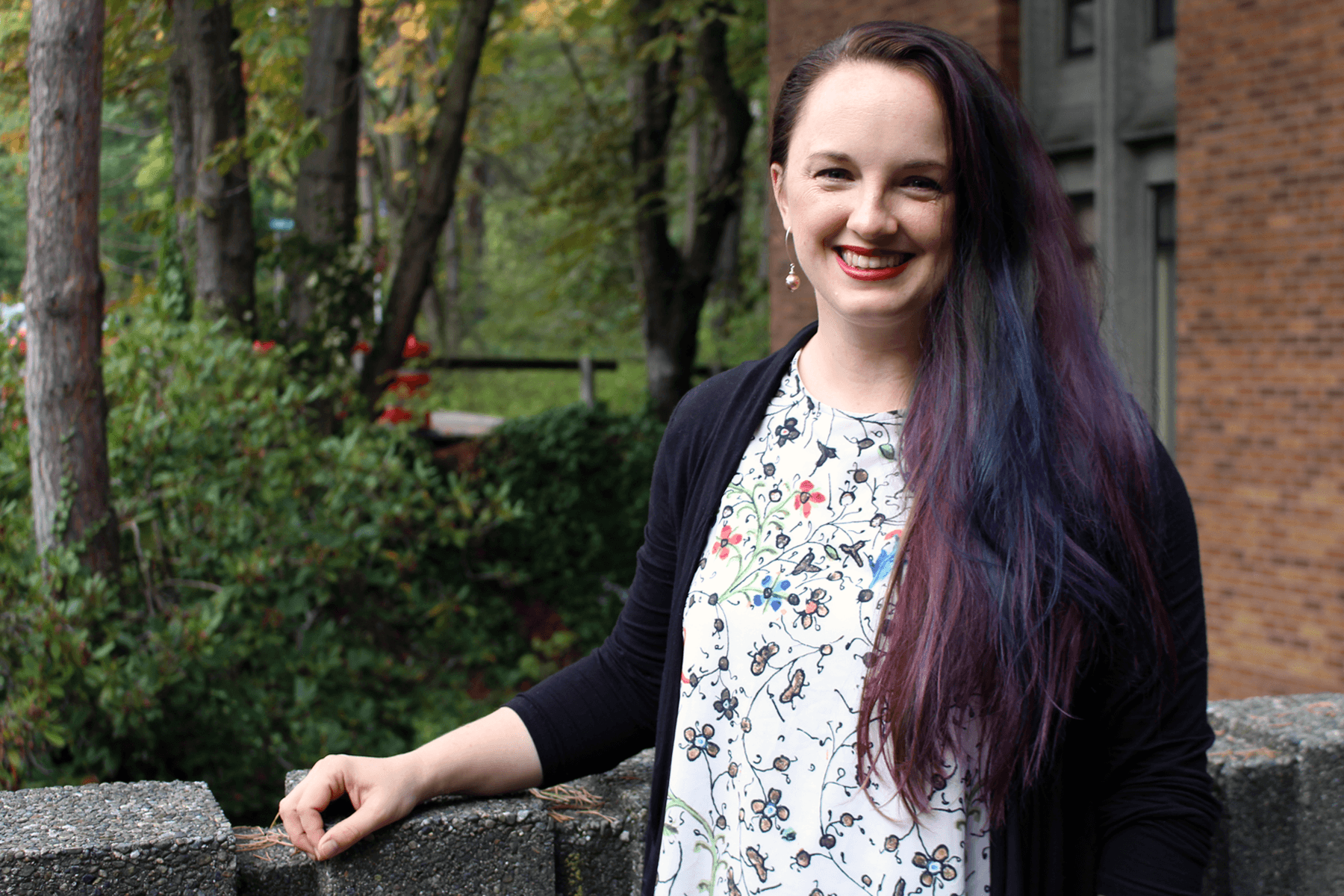
Faculty Friday: Leila K. Norako
Kate Norako is a scholar, a mother, a hula dancer, and a third-degree black belt in karate. This fall, the Hawaii-born assistant professor of Medieval Literature at the University of Washington added another title to the list of things she is: published poet. When not working on academic projects—including a forthcoming monograph on late medieval crusading literature—Norako compiled Nautilus, a chapbook of poems published in September by Dancing Girl Press.
“[Poetry] is something that’s always been on the side—and probably always will be because the bulk of what I do is medieval studies—but I’ve written ever since I was a kid,” she says.
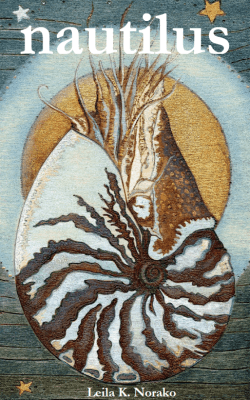
Norako’s first collection of poems, “Nautilus” was published in September by Dancing Girl Press. Since 2004, the Chicago-based publisher has produced an annual chapbook series devoted to innovative writing by women authors. (Cover art: Jennifer Park)
Norako says she began approaching the craft of writing poetry with more serious intent while serving as a post-doc researcher at Stanford. She and a fellow postdoc, Bronwen Tate, were both young mothers with next to no time on their hands, but both shared a desire to “get more writing on the page.” So together, they hatched a poetic experiment.
“Over the last several years, from one coast to another, we’ll do a monthly write-off where we’ll send poems to each other once a day for five days,” Norako explains. “We don’t comment, there’s no need to respond, it’s just the gentle accountability and that push [to write].”
Sometimes they’d write sonnets. At other times, short form poems. “It was meeting and becoming close friends with Bronwen that got me writing again,” Norako says. “All the poems I’ve managed to get out there came about from working with her, so it was a delight to get the acceptance from Dancing Girl Press.”
Many of Norako’s poems address a theme of recurrent pregnancy loss—something from her own life and the lives of countless other women that she says doesn’t frequently get talked about. Norako observed that whenever she would speak or write publically about pregnancy loss, others would come forward to share their own experiences.
“I felt that if this can help normalize and de-stigmatize it or be something that helps somebody feel like they’re not alone—no matter how alone they might feel—then that’s a good thing,” Norako says.
Between her work at the UW and raising a family with her husband, Norako is working to expand the collection of poems as well as on another collection of poems about Iceland. Her advice to anyone interested in writing poetry—or pursuing any creative endeavor for that matter—is to approach it without fear of failing.
 “Creating those low-stakes ways to generate output can be really valuable whatever your interest is,” she says. “It’s amazing how liberating that was; it didn’t matter if it was ‘good’ or ‘bad;’ it just mattered that it was there and that it existed.”
“Creating those low-stakes ways to generate output can be really valuable whatever your interest is,” she says. “It’s amazing how liberating that was; it didn’t matter if it was ‘good’ or ‘bad;’ it just mattered that it was there and that it existed.”
She says she’s especially keen on separating the act of creation from, “This idea that every hobby that we have has to be monetized or that you have to be perfect at it,” adding: “It’s okay to be ‘bad’ at painting and really like it—’bad’ by whose standards? We don’t all need to be Van Gogh.
“If it’s pleasing, if it makes you feel good—that’s what matters most.”
Reading medieval literature with empathy
A similarly fluid and prolific approach is evident in Norako’s commitment to public scholarship.
She’s published widely in an array of journals, including The Chaucer Review and Literature Compass, as well as digitally with essays, blogs like In the Middle, and efforts such as The Crusades Project—an online bibliography offering annotations of narratives that take their influence and inspiration from the historical crusades—the long series of wars fought between 1096 and 1492 under the direction of medieval popes against a wide range of enemies of many different faiths, including Sunni and Shia Muslims.
Norako commenced work on the latter project while at the University of Rochester. Its goal: “to encourage further research and discussion of the Crusades and their effect on literature at all educational levels.”
Other projects—such as a special issue of postmedieval focused on world-building in medieval literature—deftly contextualizes centuries-old literature alongside current day events, especially the cooption of mythology and history by white nationalists and other hate groups.
Norako says that much in the same way medieval literature can be “geo-temporarily slippery” regarding time and place, its present-day interpretations can be as well—“not just exercises in nostalgia, but in aspiration.”
“What you’re getting from a story is a version of what you wished for that can’t be realized anywhere but the page,” she says, referring to crusading texts. “So you have these aspirational fantasies that deftly toggle between a certain nostalgic gaze on the past when these crusades were happening and forward to the present.”
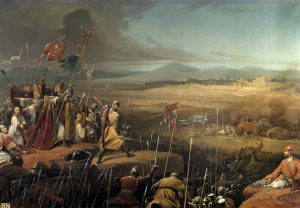
“Battle delivered under the walls of Antioch between the crusaders led by Bohemond and the army of Karbouka, general of the Sultan of Persia – The bishop Adhemar de Monteil brandish the “holy spear”, June 1098 ” Painting by Frederic Schopin (1804-1880) Chateau de Versailles, France
Last March, Norako was the guest speaker for UW’s Classics, Medieval, and Early Modern Studies Group’s Winter Quarter Ethical Pedagogies Workshop, a series devoted to building inclusive, intersectional, and responsible courses and teaching practices in pre-modern and early modern fields, which have often been seen as exclusive, white, and male.
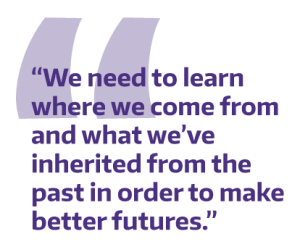 Norako introduced methods of discussing racist appropriation and misuse of Classical, medieval, and early modern imagery by hate groups.
Norako introduced methods of discussing racist appropriation and misuse of Classical, medieval, and early modern imagery by hate groups.
The lessons that come from navigating the complications and convolutions of medieval literature—evidenced, for example, in the multiple surviving versions of the romances around the life of 12th century English crusader king Richard “The Lionheart” (b. 1157 – d. 1199)—are what makes the area of study so worthwhile for Norako and so many of her students.
“This romance gazes back upon a time in which crusades to the Holy Land were not only possible but largely successful and forward to a time in which such campaigns might be possible once more,” Norako says of what she terms “recovery romances.”
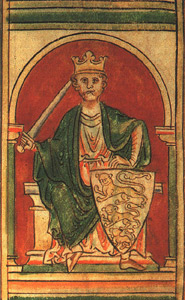
“Richard Coer de Lyon” is a Middle English romance which gives a fictionalized account of the life of Richard I, King of England, concentrating on his crusading exploits. Pictured: an illustration of Richard Coer de Lyon from a 12th-century codex.
As stories, they serve “as a form of fantasized recovery in both senses of the word: a recovery of territory and a recovery from cultural trauma.”
What makes the Richard romance so compelling is that it must contend with the “actual history” of Richard’s life and exploits.
“As such, it relies on a series of conspicuous elisions and near-formulaic repetitions in order to construct Richard and his army as superior Christians and Englishmen,” Norako writes. “Because this narrative purports to recount actual events, however, I argue that it cannot fully escape the inconveniences of history that, in the end, bring into question the project of Christian (and English) triumphalism it seeks to promulgate.”
In her classes, Norako and students frequently contend with the question of: why study the past. “What they come to quickly is that we need to learn where we come from and what we’ve inherited from the past in order to make better futures,” she says.
Norako stresses that studying medieval texts and literature can be a way of training yourself to be more empathetic.
“The way to ethically engage with these artifacts is to engage with them on their own terms,” she says. “Beowulf wasn’t written for us; it was written for a culture that could never have imagined us. So we have to be careful when we engage with that text that we’re not reading it only so far as it relates to our lived experience.
Norako also encourages students to “eradicate the need to privilege relate-ability.”
“If we really want to understand this text and understand what it is trying to say and what it is trying to tell the people who it was meant to be received by then we have to do that really hard thing of questioning our own needs and putting aside our own needs for that text to mean something to us personally or make sense to us.”

That, on its most elemental level, is what we’re practicing when we set aside that need for relate-ability, Norako says.
“It’s fine to relate to something, but what are we not encountering or experiencing when we don’t?
“How do we become better and more ethical global citizens if we’re not allowing ourselves to encounter peoples and walks of life and experiences that don’t resonate with our lives and I think the Middle Ages provides a good method for a lot of students.”
It’s a question Norako has asked many herself in setting her own course in academia.
“It is trying to provide a sense of scope and a sense of the variety of cultural registers in which these ideas circulated,” Norako says, adding that, through that process of learning to read a text, “we learn a lot about the desires, anxieties, and xenophobia circulating at that time.”
More individual poems by Norako can be read at Revolution John, Amaryllis, and By&By Poetry.